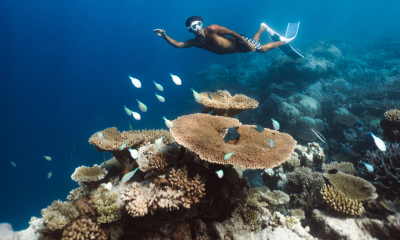Insiders
Soneva Fushi To Host Third Six Senses SLOW LIFE Symposium

Maldives Promotion House – This October, Soneva Fushi by Six Senses, will host the third Six Senses “S.L.O.W. LIFE Symposium” from 6th to 9th. Convening world-leading thinkers, policy makers and business leaders, the symposium aims to accelerate progress towards sustainable business practices in the tourism industry.
The participants will join hands with the government to confront the principle challenges facing the travel and tourism industry, including low-carbon infrastructure, transportation, resort management and threatened biodiversity according to the organizers. Attendees will also share insights, projections and plans, making connections that could influence the future direction of the tourism industry.
“This is not just any old symposium on eco-tourism, but one where walking the talk about eco-tourism comes naturally and where proven leadership is all around us. I suspect we all believe that the very idea of a sustainable future for humankind may well depend more on this industry than on any other,” Founder and Director of Forum for the Future, Jonathon Porritt, said during the SLOW LIFE Symposium in 2010.

Sir Richard Branson and American actor and environmental campaigner, Edward Norton are among the pantheon of global environmental leaders who are set to speak at the symposium. Sir Richard is scheduled to talk about the challenge of a changing environment to his business portfolio. He will also discuss the need for the Virgin empire to evolve rapidly to meet these changes and the steps he is already taking in his businesses and through organisations like the Carbon War Room.
He will further stress on alternative fuel sources and new technologies to power Virgin’s fleet of trains and aircrafts and the need to adapt buildings and infrastructure to meet the challenges of rising fossil fuel prices and to stem carbon emissions.
Edward Norton will speak about the benefits that the tourism industry can bring to local eco-systems, wildlife and communities. He will take examples from large wildlife reserves that might otherwise be developed as mines or farms and the mutual benefit of supporting communities to protect their local environment.
His focus will mainly be on the role that tourism can play in implementing ‘Best Practice’ on both a local and global scale, and how visionary policy makers and business leaders can form an alliance, particularly in support of small island states. Mr Norton will draw on his role as President of the board of trustees of the Maasai Wilderness Conservation Trust.
Adventurer and environmentalist David de Rothschild will also be attending this year’s symposium. A founder of myoo.com, a group that uses exploration and storytelling as a way to give nature a voice, and for his headline-grabbing adventures such as the Plastiki expedition which involved sailing across the Pacific on a catamaran made entirely with reclaimed plastic bottles, de Rothschild will be a big asset in helping communicate the symposium’s findings and messages.
Others scheduled to speak include President Mohamed Nasheed of Maldives and Sonu Shivdasani, Chairman and CEO of Six Senses, the luxury resort company at the forefront of eco-tourism innovation, Jean Ballandras, Secretary General for the Reunion Islands, Jonathon Porritt, Forum for the Future, Tim Smit, Co-Founder and CEO of the Eden Project; Fabien Cousteau, grandson of Jacques Cousteau and Founder of Plant A Fish, Chris Gorrell-Barnes of Blue Foundation and Mark Lynas, Author and Climate Change Advisor to President Nasheed.
 “Tourism does so much good for sustainability. If it wasn’t for tourism, most of the fantastic reserves in South Africa or Namibia would be mines or farms. The land would go to waste. It would be stripped of lumber. Animals would be killed and eaten. The thing we can do as individuals is to try and make tourism sustainable,” Chairman and CEO of Six Senses, Sonu Shivdasani said.
“Tourism does so much good for sustainability. If it wasn’t for tourism, most of the fantastic reserves in South Africa or Namibia would be mines or farms. The land would go to waste. It would be stripped of lumber. Animals would be killed and eaten. The thing we can do as individuals is to try and make tourism sustainable,” Chairman and CEO of Six Senses, Sonu Shivdasani said.
“Six Senses has a voice within the travel and tourism industry and we want to use our voice to encourage every level of the industry to be more sustainable in its choices. The travel and tourism industry needs to do more. We want our findings to reach the heart of the industry, going right back to investment and development stages.”
Symposium attendees will engage in three days and three evenings of intimate conversations, insightful presentations and robust panel discussions. Attendees will discuss ways in which the tourism industry, small islands and tropical states can join forces to mutually secure prosperous and sustainable economic futures.
Amongst others, discussion topics will include the low-carbon development targets of the Cartagena Dialogue group of progressive countries and the impact this may have on international policy; how to turn a community sustainable; the coming global energy crisis and how it might affect small island states; protecting marine bio-diversity; engaging local communities in ambitious carbon reduction targets; investing in sustainable technologies and the challenge of adapting transportation in a low-carbon economy; and the consequences of inaction.
Action
Freediving with tiger sharks: Shark Expedition Fuvahmulah collaborates with marine biologist Andriana Fragola

Shark Expedition Fuvahmulah, renowned for its world-class scuba diving encounters, has announced an exciting expansion: the chance to freedive with tiger sharks in the Maldives’ southernmost atoll.
Fuvahmulah, often hailed as the “Tiger Shark Capital of the World,” is the only place on the planet where year-round encounters with tiger sharks are virtually guaranteed. With more than 280 identified resident tiger sharks, the island has become a bucket-list destination for divers and marine enthusiasts alike.
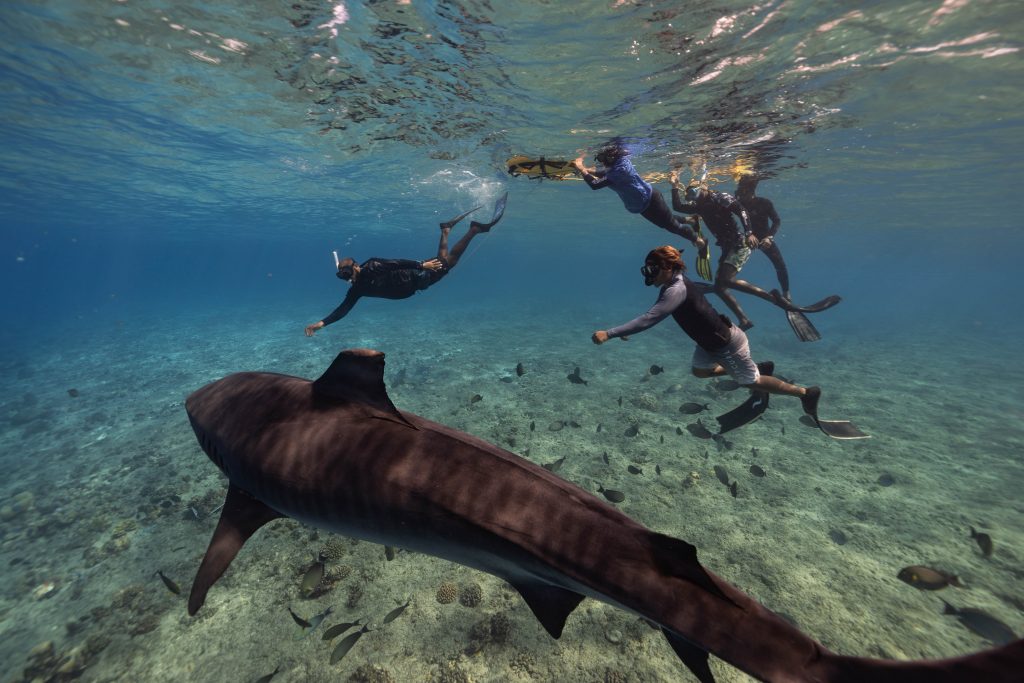
The newly introduced freediving experience offers a unique way to interact with these apex predators. Unlike scuba diving, freediving takes place without bubbles or heavy gear, allowing participants to connect with tiger sharks in a quieter, more natural way. This approach often makes the encounter more comfortable for the sharks and more intimate for the diver.
Guiding these expeditions is Andriana “Andy” Fragola, a marine biologist, shark diver, and conservationist currently based in Hawaii. Andy holds a Master’s Degree in Marine Conservation Biology with a focus on shark microbiology and has dedicated her career to shark research, conservation, and public education. Through her work in media and content creation, she strives to raise awareness about the importance of shark conservation and inspire people to take action to protect marine ecosystems.
“Freediving with tiger sharks is a raw and transformative experience,” says Andy. “Being eye-to-eye with these incredible animals without the barrier of scuba gear allows you to see them for what they truly are—powerful, intelligent, and essential to the health of our oceans.”
Shark Expedition Fuvahmulah ensures that all freediving activities are conducted under strict safety protocols. With experienced professionals like Andy leading the dives, participants can expect both an exhilarating and responsible adventure.
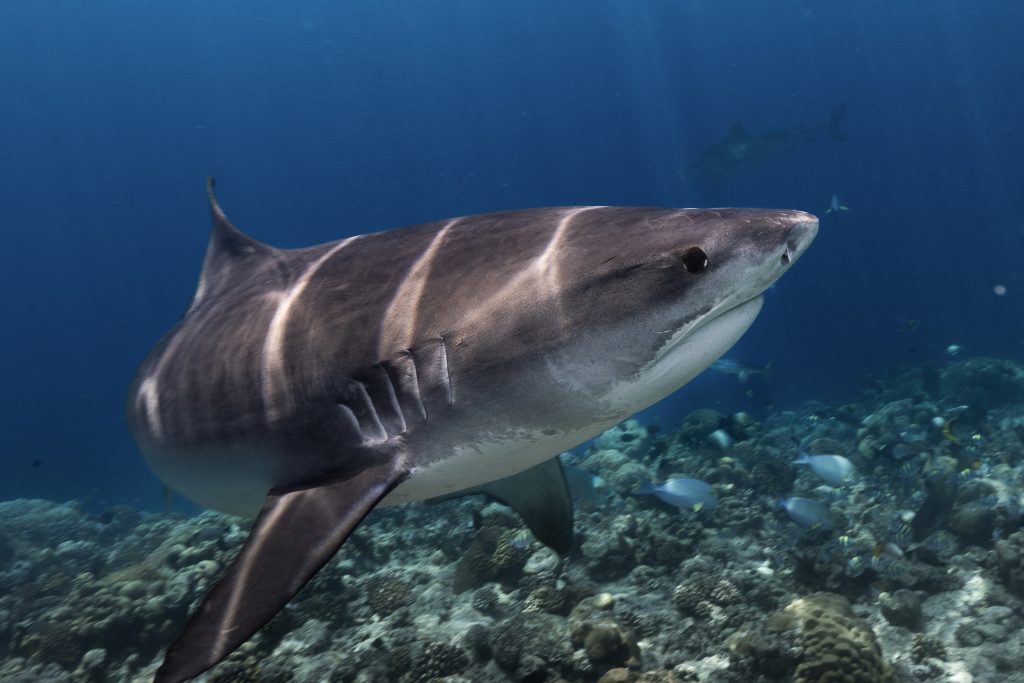
Why this experience stands out:
- Eye-to-eye encounters with tiger sharks in their natural habitat.
- A deeper, more personal connection with marine life.
- Expert-led guidance ensuring safety and conservation awareness.
In addition to freediving, Shark Expedition Fuvahmulah offers a range of packages, including accommodation options, making it easier for adventurers to fully immerse themselves in the island’s extraordinary marine environment.
For bookings and more information:
📧 Email: sales@scuba-expeditions.com
📱 WhatsApp: +960 9894653
🌐 www.scuba-expeditions.com
News
MIC appoints Ali Shakir as Group General Manager

Maldives Inflight Catering Pvt Ltd (MIC) has announced the appointment of Ali Shakir as the Group General Manager. With over 27 years of experience in the hospitality industry, Ali Shakir will now oversee operations for the Maldives Inflight Kitchen, Hulhule Island Hotel, and Madifushi Private Island Maldives.
Ali Shakir, who most recently served as General Manager at OBLU NATURE Helengeli by SENTIDO, played a pivotal role in the resort’s redevelopment and reopening. Prior to that, he joined Atmosphere Core in 2019 as Resort Manager at VARU By Atmosphere, where he was instrumental in the pre-opening of several properties, including OBLU XPERIENCE Ailafushi, OBLU SELECT Lobigili, OZEN RESERVE BOLIFUSHI, and VARU By Atmosphere. His wealth of experience also includes key positions at prestigious resorts such as Angsana Velavaru, Hulhule Island Hotel, and Paradise Island Resort and Spa.
Ali is no stranger to MIC, having spent more than 15 years at Hulhule Island Hotel, where he rose through the ranks to become Executive Assistant Manager before departing in 2019.
Commenting on his new role, Ali Shakir expressed his enthusiasm:
“I am honored to rejoin MIC and lead the operations of these iconic properties. This company has always held a special place in my career, and I am excited to work with the talented team to drive further success and innovation.”
Ibrahim Shareef Mohamed, Managing Director of MIC, welcomed Ali to the leadership team, praising his extensive experience and strategic vision:
“We are delighted to have Ali back at MIC. His proven track record in the hospitality sector, combined with his in-depth knowledge of Hulhule Island Hotel and his previous achievements, makes him the ideal leader to take us forward. I have no doubt that under his leadership, MIC will continue to set benchmarks for excellence.”
Ali Shakir holds a General Managers Program certificate from Cornell University, USA, and a General Hotel Service certification from the Institute of Hotel and Catering Service, Maldives.
MIC is a joint venture between Maldives Airports Company Limited and SATS Ltd, renowned for its inflight catering services to airlines and private jets. Beyond the Maldives Inflight Kitchen, MIC also manages Hulhule Island Hotel, the only airport hotel at Velana International Airport, and the luxurious Madifushi Private Island Maldives in Meemu Atoll.
Tips & Advice
Flying after scuba diving: Essential guidelines for safe travel

Scuba diving in the Maldives offers an unparalleled experience, with its vibrant coral reefs, diverse marine life, and crystal-clear waters. However, one crucial aspect that divers must consider is the timing of their flights after diving. Understanding the recommended waiting periods before flying is essential to ensure safety and prevent decompression sickness. Here’s what you need to know.
Understanding Decompression Sickness
Decompression sickness, also known as “the bends,” occurs when nitrogen bubbles form in the bloodstream and tissues due to rapid changes in pressure. This can happen if a diver ascends too quickly or flies too soon after diving. The reduced cabin pressure in an airplane can exacerbate the formation of these bubbles, leading to serious health risks.

Recommended Waiting Times
The waiting time before flying after scuba diving depends on the type and number of dives completed. Here are the general guidelines:
- Single Dive: If you have completed a single, no-decompression dive, it is recommended to wait at least 12 hours before flying. This allows sufficient time for the body to eliminate excess nitrogen.
- Multiple Dives or Multiple Days of Diving: For divers who have completed multiple dives or have been diving over several days, the recommended waiting period extends to 18 to 24 hours. This longer duration helps ensure that nitrogen levels in the body have decreased to safe levels.
- Dives Requiring Decompression Stops: If your dive profile included decompression stops, it is crucial to wait at least 24 to 48 hours before boarding a flight. Decompression dives involve higher nitrogen absorption, necessitating a longer off-gassing period.
Seaplane and Domestic Flights
Many tourists visiting resorts and other islands in the Maldives travel by seaplane or domestic flights. While these flights generally operate at lower altitudes compared to international flights, the same waiting time guidelines apply. The reason is that even at lower altitudes, the risk of decompression sickness remains significant due to the changes in pressure.
Practical Tips for Divers
- Plan Your Dives and Flights: When planning your diving trip, consider your flight schedule. Ensure that you have ample time between your last dive and your flight to adhere to the recommended waiting periods.
- Stay Hydrated: Proper hydration can aid in the elimination of nitrogen from the body. Drink plenty of water before and after your dives.
- Monitor Your Health: Pay attention to any symptoms of decompression sickness, such as joint pain, dizziness, or difficulty breathing. If you experience any of these symptoms, seek medical attention immediately.
- Use Dive Computers: Modern dive computers can help track your nitrogen levels and provide personalized recommendations for safe flying times based on your dive profile.
Flying after scuba diving requires careful consideration and adherence to safety guidelines to prevent decompression sickness. By following the recommended waiting times and taking necessary precautions, divers can enjoy their underwater adventures in the Maldives and travel safely. Always consult with dive professionals or medical experts if you have any concerns about your health and safety.
-

 Cooking1 week ago
Cooking1 week agoFrom shoreline to hotpot: New dining experiences at Sun Siyam Iru Veli
-
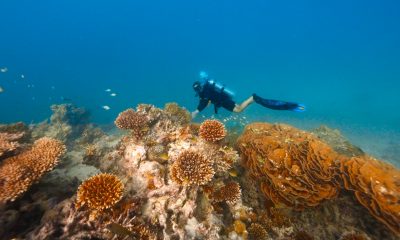
 News1 week ago
News1 week agoVentive Hospitality aligns Maldives portfolio with Green Fins marine sustainability platform
-
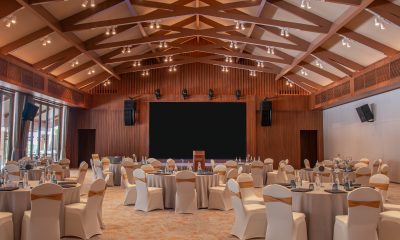
 Business1 week ago
Business1 week agoFeydhoo Hall opens at dusitD2 Feydhoo Maldives as new event space
-

 News1 week ago
News1 week agoThe Ritz-Carlton Maldives, Fari Islands launches conservation programme for environmental observances
-

 Drink1 week ago
Drink1 week agoProvence comes to Maldives with Château Minuty dinner at Milaidhoo Maldives
-
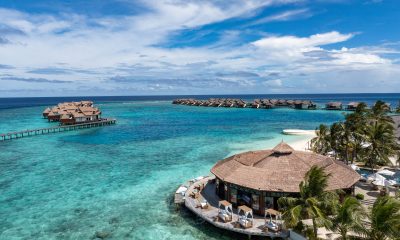
 Awards1 week ago
Awards1 week agoDouble gold win for OZEN RESERVE BOLIFUSHI and OZEN LIFE MAADHOO at Junior Travel Awards
-
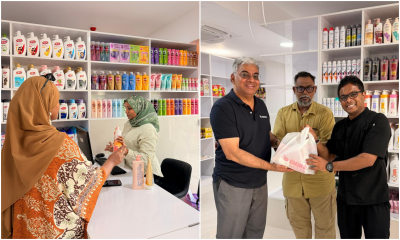
 Business1 week ago
Business1 week agoBBM expands retail presence with new Hulhumalé outlet
-

 Featured1 week ago
Featured1 week agoCity Iftar experience curated at JEN Maldives by Shangri-La









